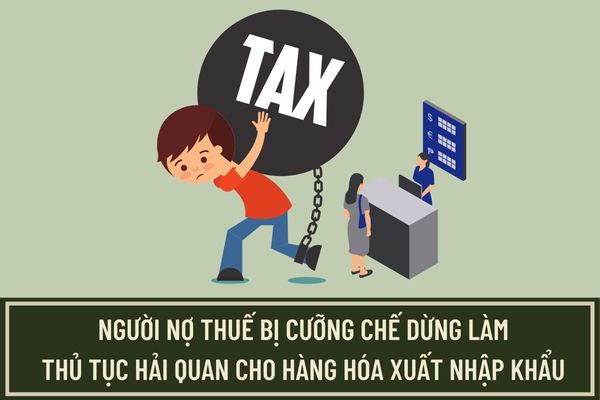Procedure of Enforcement to Cease Customs Procedures for Export-Import Goods for Taxpayers with Tax Debts: Implementation Guide
How is the process of enforcing the suspension of customs procedures for import and export goods for tax debtors implemented?
Based on Section 3.1, Part 3 of the Process issued with Decision 1795/QD-TCT in 2022, the process of enforcing the suspension of customs procedures for import and export goods for tax debtors includes the following steps:
Step 1: Prepare a list of tax debtors scheduled for enforcement
Step 2: Draft and send the enforcement proposal document
Step 3: Monitor the implementation of the enforcement measures

How is the process of enforcing the suspension of customs procedures for import and export goods for tax debtors implemented?
How is the list of tax debtors for the enforcement suspension of customs procedures for import and export goods prepared?
Based on Section 3.1, Part 3 of the Process issued with Decision 1795/QD-TCT in 2022, the preparation of the list of tax debtors for the enforcement suspension of customs procedures for import and export goods is regulated as follows:
Basis for preparing the list of tax debtors for enforcement:
Tax debtors who have outstanding tax debts and are engaged in export and import activities or have conducted such activities at least once within the past 12 months, falling under one of the following cases:
- The tax debtor does not have an account at the State Treasury, commercial banks, other credit institutions, or the tax agency has sent a request for account information verification but received no or incomplete information from the enforcing bank, commercial bank, or other credit institutions.
- The tax debtor’s account has been subjected to enforcement measures by the tax agency, such as account deduction or account freeze, but as of the list preparation date, the enforced tax debt has not been fully paid into the state budget.
- The tax debtor is subjected to one of the following enforcement measures by the tax agency: Suspension of invoice usage; Asset seizure and auction; Collection of money, other assets held by other entities; or the tax debtor is in the period during which the tax agency has proposed the business registration agency revoke the business registration certificate, but such a decision has not yet been made.
- The tax debtor with outstanding tax debts displays behavior of asset dispersal or absconding.
Preparation of the list:
Daily, officials review the database of the tax agency and other relevant documents provided by organizations or individuals to identify tax debtors engaged in export and import activities or have conducted such activities at least once within the past 12 months as stipulated in point 3.1.a above, and consolidate them into a list of tax debtors to propose to the Customs authorities for the enforcement of the suspension of customs procedures for import and export goods.
Officials can obtain information about the tax debtor’s export and import activities provided by the Customs authority according to the Information Exchange Regulations between the Customs authority and the tax agency (through Webservice search, etc.)
According to which principle are enforcement measures applied?
Based on Section 1, Part B of the Process issued with Decision 1795/QD-TCT in 2022, the principles for applying enforcement measures for tax debtors are regulated as follows:
(1) For enforcement measures such as account deduction, account freeze at the State Treasury, commercial banks, and other credit institutions; Wage or income deduction; Proposal to the Customs authority to enforce by suspending customs procedures for export and import goods, the implementation is as follows:
- The enforcement measure of account deduction or account freeze applies to tax debtors with accounts at the State Treasury, commercial banks, and other credit institutions. If the tax debtor is a business or organization but the tax agency’s database does not have correct account information, the tax agency must verify the account information to enforce.
- The enforcement measure of wage or income deduction applies only to individual tax debtors receiving wages, salaries, or income from:
+ An agency or organization in which the individual is a staff member;
+ An agency or organization with which the individual has a labor contract of at least six months;
+ An agency or organization paying pensions or disability allowances.
- The enforcement measure of suspending customs procedures for export and import goods applies only if the tax agency has sufficient information and documents indicating that the tax debtor is engaged in or has conducted export and import activities at least once within the past 12 months.
The tax agency shall apply the most appropriate and effective enforcement measures based on the actual situation of the tax debtor.
(2) The enforcement measures specified in points d, dd, e, and g of Clause 1, Article 125 of the Tax Management Law 2019 must be implemented sequentially from the first to the next; if the previous enforcement measure cannot be applied, the next one will be executed.
(3) Each enforcement decision for each tax debtor must be issued continuously and consecutively.
For enforcement measures specified in points d, dd, e of Clause 1, Article 125 of the Tax Management Law 2019, if there is information or conditions that make a previous enforcement measure or a more effective subsequent measure feasible, the tax authority shall simultaneously apply the previous or subsequent enforcement measure to collect the tax debt into the state budget.
(4) During the period from when the tax agency requests the business registration agency to revoke the business registration certificate to when a decision is made or a non-revocation notice is issued, the tax agency may apply suitable enforcement measures to ensure effective tax management.
(5) In cases where the tax debtor shows signs of asset dispersal or absconding, the enforced amount shall be the total outstanding tax debt of the debtor.
LawNet